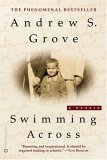Summary | Excerpt | Reviews | Readalikes | Genres & Themes | Author Bio

Critics' Opinion:
Readers' Opinion:
First Published:
Nov 2001, 320 pages
Paperback:
Nov 2002, 304 pages
My mother hated Bacsalmas. She was a city girl, well educated, a would-be concert pianist, used to going to concerts and the theater. All of a sudden, she found herself in a small town out in the provinces. Not only was she living in a house with dirt floors and an outhouse, but she had to share the house with some of my father's relatives and partners. My mother was the newcomer and the outsider. She was a loner and very uncomfortable with communal living. She couldn't wait to get out of there, but she would not have a chance to do so for a while.
Shortly before I was born, my parents temporarily moved to Budapest so that my mother could give birth in a good hospital. My mother would have liked to stay, but she returned to Bacsalmas with my father and me.
She finally got her wish in 1938, when I was two years old. My father decided to set up a branch of the dairy in Budapest to service his growing number of city customers. We moved into an apartment on Kiraly Street, a few blocks from the dairy.
Budapest is a city of two parts, separated by the Danube. The Buda side was hilly and dotted with old churches and castles and ramparts and rich homes. Pest was the commercial side, with the apartment houses spreading out from the city center. The natural setting, with its combination of the hills and the river, was beautiful and the stylish apartment houses and wide avenues lined with trees made for a pleasant environment.
Kiraly Street was a busy thoroughfare connecting the central Ring Road on the Pest side to the big City Park farther out. A streetcar line ran down the middle, making the street even busier. It wasn't particularly noisy, but something interesting was always going on.
There was a Jewish quarter in Budapest. It was located about a mile or so from where we lived. It was a strange, foreign area, where the men wore black hats and dark coats and long side curls and smelled odd. We were Jewish, too, but they were part of a different world.
Our world was a typical middle-class neighborhood. Ours was a nice street but nothing fancy. Our apartment house, too, was like many others: a ground floor with shops facing the street, topped with two stories of apartments surrounding a central courtyard. A small one-story building in the courtyard housed a photo studio. An older couple who lived in one of the ground-floor apartments in the back of the courtyard provided basic caretaker services. The man doubled as a shoemaker as well as superintendent of the building, while his wife, a kindly old lady, picked up packages for tenants, let in tradesmen, and performed other ordinary chores.
In our building, most of the apartments faced inward, their doors and windows opening onto the courtyard. A narrow balcony, maybe three or four feet wide with a wrought-iron railing, ran around the courtyard to connect the apartments on each floor. There was a communal toilet near the back of the balcony on each floor. This was for the inside apartments, which did not have their own toilets. A stairway connected the floors at each end of the balcony. In front, the stairway was wide and respectable. The back stairway was narrow and dark.
The apartments that faced the street were the better apartments. They were bigger and had their own bathrooms. Our apartment was one story up from the ground floor. Two rooms faced the street, the Big Room and the Little Room. Both were equally deep, but the Big Room had two windows while the Little Room had just one. The windows were tall and narrow and opened in the center, like doors; the sill was waist-high, so you wouldn't fall out. During the summer, the windows were always open. You could look out at the apartment buildings across the street and watch the traffic and the streetcars and the people coming and going on Kiraly Street. Even when the windows were closed during the winter, the rooms were bright and airy.
Copyright © 2001 by Andrew S. Grove





The Funeral Cryer by Wenyan Lu
Debut novelist Wenyan Lu brings us this witty yet profound story about one woman's midlife reawakening in contemporary rural China.
Your guide toexceptional books
BookBrowse seeks out and recommends the best in contemporary fiction and nonfiction—books that not only engage and entertain but also deepen our understanding of ourselves and the world around us.